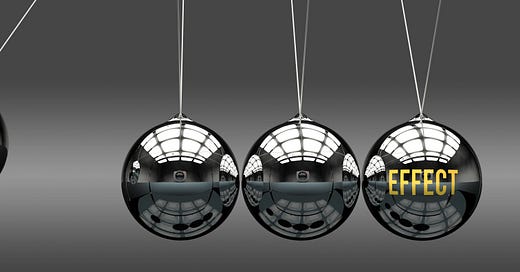Worship Cause and Effect
Worship doesn’t invite God’s presence; it acknowledges it. God has called us out of darkness into his amazing light that we may speak (sing) of his wonderful acts (1 Pet 2:9). The Father is looking for those who worship him in spirit and truth (John 4:23).
Cause and effect is a relationship in which a person, action, or thing makes another event, action, or thing occur. A cause must always precede an effect in order for that effect to occur. So, the effect is then a consequence of the cause. A model for this cause-and-effect worship understanding is found in Isaiah 6:1-8. The holiness of God is revealed to the prophet Isaiah (cause), and his natural worship response is contrition (effect), “Woe is me for I am ruined!” (Isa 6:5). God revealed his mercy (cause), and Isaiah’s worship response is service (effect), “Here I am. Send me” (Isa 6:8). If our worship responses are the effect, then it is not possible for those worship actions to also be the cause.
Worship is our response to the overtures of love from the heart of the Father. It is kindled within us only when the spirit of God touches our human spirit. Forms and rituals do not produce (cause) worship, nor does the disuse of forms and rituals. We can use all the right methods (effect), we can have the best possible liturgy (effect), but we have not worshiped the Lord until his Spirit (cause) touches our spirit.[1]
It is true that we occasionally bump into God in our worship efforts.[2] When we do, we sometimes assume the encounter was based on what we sang, said, or did and how we sang, said, or did it because we literally asked God to show up. But our worship actions didn’t initiate this worship encounter with God; He did. He is calling us out of darkness and looking for us to worship him in spirit and truth. He is present long before we arrive and is waiting patiently for us to acknowledge his invitation to respond to him and join his conversation.
What we do or how we do it doesn’t cause a response; it is the response. God’s revelation can’t be generated by the effect since the effect is a response to the cause. As good as our various worship actions are, they still can’t cause worship to occur, because those worship actions are the effect. Those worship actions may prompt, remind, exhort, prod, or encourage more effect, but they can’t cause cause. We can acknowledge the cause, but we can’t generate it. We can respond to the cause, but we can’t initiate it. We can celebrate the cause, but we can’t create it. God causes…we effect.
[1] Richard Foster, Celebration of Discipline (San Francisco: HarperCollins, 1978), 158.
[2] See Fr. Dominic Grassi, Bumping into God: Finding Grace in Unexpected Places (Chicago: Loyola Press, 1999).




